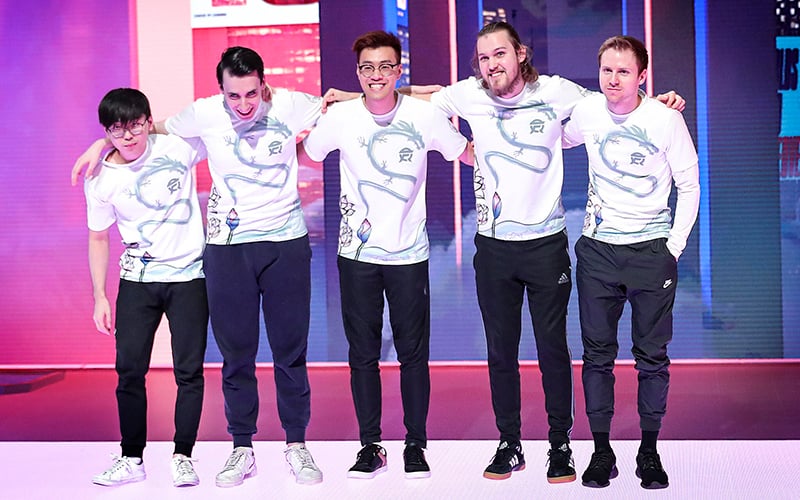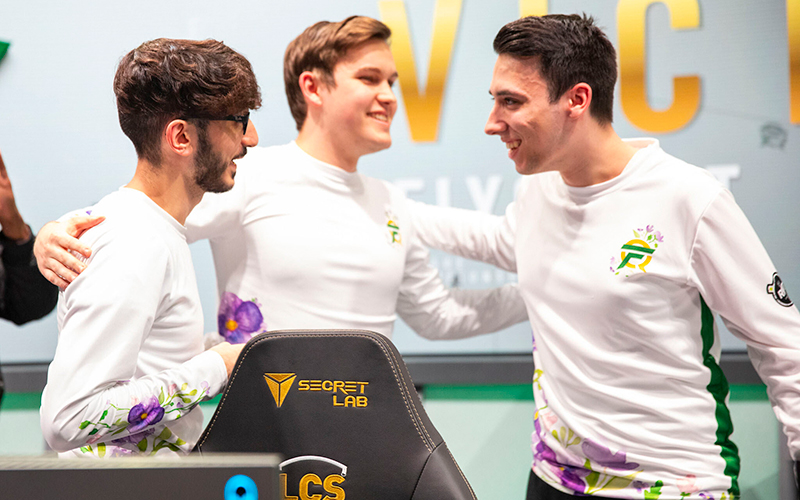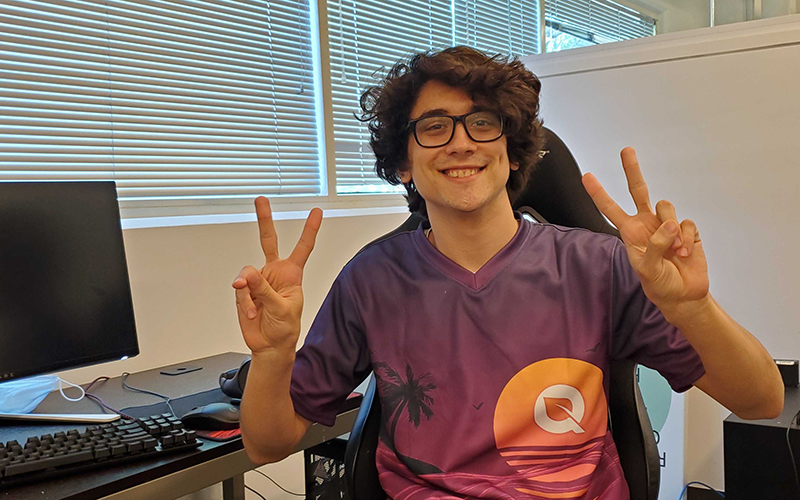
The FlyQuest team – from left, Lee “IgNar” Dong-geun, Tristan “PowerOfEvil” Schrage, Jason “WildTurtle” Tran, Lucas “Santorin” Tao Kilmer Larsen and Colin “Solo” Earnest – take a bow at the 2020 League of Legends World Championship in Shanghai.(Photo courtesy of LoL Esports)

Omran “V1per” Shoura, left, Lucas “Santorin” Tao Kilmer Larsen and Tristan “PowerOfEvil” Schrage celebrate a team win in their TreeQuest jerseys during the LCS 2020 Spring Split. (Photo courtesy of LoL Esports)

FlyQuest jungler Brandon Joel “Josedeodo” Villegas wears the team’s promotional jersey for SunnyQuest. (Photo courtesy of FlyQuest)
LOS ANGELES – More than 115 million people play League of Legends each month, and one of North America’s top 10 ranked esports teams – FlyQuest – has been using its platform to put sustainability at the forefront of gamers’ minds.
Sustainable practices aren’t typically thought of when it comes to gaming, but FlyQuest’s work has made fans take notice. Gamers in the United States used 34 terawatt-hours of electricity in 2020, Wired reported, which exceeds the annual consumption of West Virginia. Producing that much energy emits the same amount of carbon dioxide as 5 million cars.
“When we first got together in 2018, we were really looking for an opportunity to work with a team that had a bigger objective than winning titles and having the coolest merch,” said Ricky Gonzalez, vice president of content at FlyQuest. “All that’s awesome, but for us we were more excited about something bigger than our win-loss record.”
The slogan of the LA-based team is “Showcase greatness,” which extends to its commitment to developing and promoting sustainable practices with its platform.
To kick off 2020, we're choosing to Showcase Greatness by going green, and it's inspiring everything we do including our new 2020 Spring Jerseys. Read more ⬇️#ShowcaseGreatness #GoGreen? https://t.co/Kx8noYrs2F pic.twitter.com/Kr6jzGreGO
— FlyQuest (@FlyQuest) January 23, 2020
At the start of 2020, FlyQuest announced its new sustainability campaigns and launched the Go Green Initiative. These campaigns centered on FlyQuest’s League of Legends team and the team’s in-game performance. Team members would set up objectives and goals to complete while competing, which would determine the amount they would donate. The team partners with nonprofits working in sustainability and self-care.
So far, FlyQuest has run campaigns on Twitter about conserving trees, saving the bees, mental health and self-care, and solar energy. During the latter half of 2020, the team paired with the Coral Reef Alliance, whose mission is to save the world’s coral reefs at the local, regional and global level, for FlyQuest’s SeaQuest campaign.
“As an organization, we identified two years ago that there was a whole untapped revenue pot for corporate donations,” said Megan Crain, an associate development manager at the alliance. “We built up a corporate program, where brands can enter into mutually beneficial partnerships and have a direct impact on our conservation work. FlyQuest reached out to us through our website and it became very clear immediately that this was something they were passionate about.”
No water, no life
No blue, no green
– Sylvia Earle?This Summer, we're committed to saving our planet, one coral reef at a time!
Read more: https://t.co/n1ilpW6ROl pic.twitter.com/iYzpU3iw1a
— FlyQuest (@FlyQuest) June 9, 2020
With each campaign, the team set in-game goals and milestones that would equate to donations, regardless of whether the team won or lost. These goals and objectives were set for every match the team played and would be adjusted for the campaign running at the time.
“The final donation was just a bit over $15,000,” Crain said. “They really helped amplify our voice to their community. We started to get more donations from outside our corporate program from fans who were simply watching their live streams and matches.”
Through One Tree Planted, FlyQuest helped plant more than 5,000 trees during its TreeQuest campaign, Inven Global reported.
Tristan “PowerOfEvil” Schrage was the team’s leading planter, with a total of 70 trees, by scoring the most kills and assists. On top of that, fellow League Championship Series teams Cloud9, TSM and Dignitas all contributed by donating to One Tree Planted.
“We have a unique opportunity to talk to an audience that might not be interacting with social or environmental causes that are out there,” Gonzalez said. “It’s really easy as a gamer to just get locked into your own world on the computer and always be online. We’re in a little niche of our own, and I think it’s important for all gamers to be aware of these issues.”
These campaigns have allowed the team to do unique forms of content, such as a WebToon series for BeeQuest and interactive posts from the community for MeQuest.
https://twitter.com/FlyQuest/status/1352723113134403584?s=20
FlyQuest’s partnerships with these charities and organizations have put sustainability at the forefront of esports, prompting other teams to promote sustainable practices.
“We’ve never partnered with any sports team or anything like it, and since then we’ve now seen more esports teams reach out to us. (FlyQuest) really put us on the map as a nonprofit and a partner,” said Crain, in reference to the Coral Reef Alliance.
In League of Legends, teams compete in their respective regions and leagues from February to August. Qualifying teams also compete in the World Championship in October – a month-long tournament of the world’s best players competing for the Summoner’s Cup.
In 2020, the team had its best year since its inception in 2017, appearing in back-to-back LCS Finals versus Cloud9 and TSM, respectively. The team would go on to represent North America at the League of Legends 2020 World Championship before dropping out of the Group Stage with a 3-3 record against China’s Top Esports, Korea’s DRX and Russia’s Unicorns of Love.
2021 became a rebuilding year, as the team started with an entirely new roster and brought in Latin American superstar Brandon Joel “Josedeodo” Villegas to build the team around.
FlyQuest’s LCS team experienced ups and downs throughout 2021, finishing eighth in the LCS 2021 Spring Split and ninth in the 2021 Summer Split.
The team is backed by the Milwaukee Bucks, which, like other NBA teams, has invested in esports. The Golden State Warriors and Cleveland Cavaliers also have investments in the LCS with Golden Guardians and 2021 LCS Summer Split champions 100 Thieves, respectively. Madison Square Garden also owns a stake in historic esports organization CLG (Counter Logic Gaming).
Esports has three levels of play: casual, ranked and competitive.
“Despite our challenges in competitive in 2021,” Gonzalez said, “we still maintained our fans and our identity. It was important for us to have our identity be separate from our record. We still have positive fan sentiment across the board, because we give fans a reason to cheer for us that’s not necessarily based on winning and performance.”
